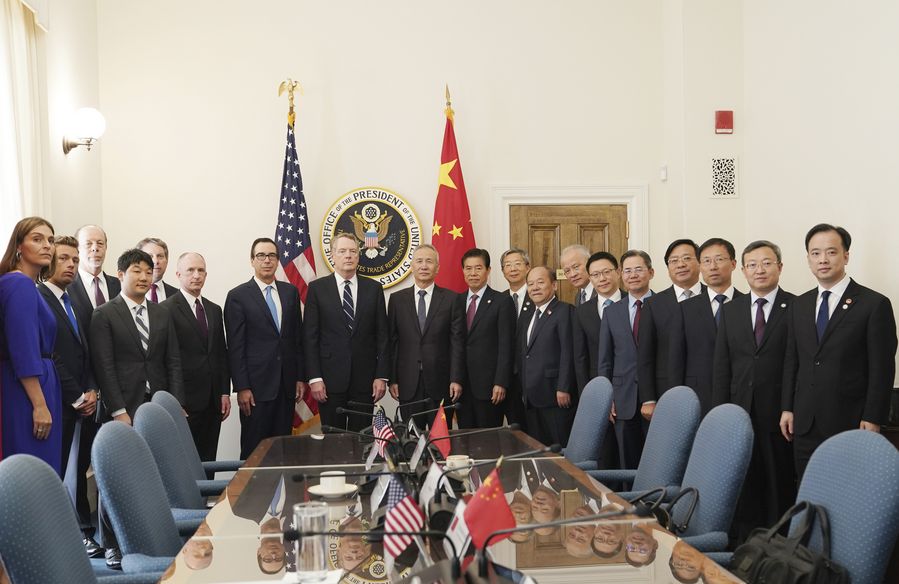
Chinese Vice Premier Liu He, also a member of the Political Bureau of the Communist Party of China Central Committee and chief of the Chinese side of the China-U.S. comprehensive economic dialogue, attends a new round of high-level economic and trade consultations together with U.S. Trade Representative Robert Lighthizer and Treasury Secretary Steven Mnuchin in Washington D.C., the United States, Oct. 10, 2019. (Xinhua/Liu Jie)
Hailing the phase-one economic and trade deal as moving in the right direction to stabilize U.S.-China economic relationship, experts also emphasize that the implementation will be crucial.
by Xinhua writer Yang Shilong, Pan Lijun
NEW YORK, Dec. 18 (Xinhua) -- The phase-one economic and trade deal announced by the United States and China signals the world's two largest economies are moving "in the right direction" to stabilize their all-important economic relationship, American experts told Xinhua in recent interviews.
"This is a positive step that will prevent further tariff escalation, which would be harmful to both the U.S. and Chinese economies," said Edward Alden, an economist and senior fellow at the Council on Foreign Relations.
Sourabh Gupta, a senior fellow at the Washington-based Institute for China-America Studies, agreed.
"It is a 'good enough' deal. It signals that China and the U.S. have been able to place a floor beneath their trade, investment and IPR (intellectual property right) quarrels and are moving in the right direction in terms of stabilizing their all-important economic relationship," Gupta said.
Though it has been a "long and circuitous road" to the phase-one deal, it is good for both the United States and China, as well as for the world, said Robert Kuhn, chairman of the Kuhn Foundation.
"The agreement is measured and balanced, carefully negotiated to achieve some specific objectives now and to prepare the way for continuing agreement on harder issues in the future," Kuhn said.
Stephen Roach, a senior fellow at Yale University's Jackson Institute of Global Affairs, said the deal underscores "the commitment of both nations to provide some relief to the tariff-related pressures on both economies, as well as the broader global economy."
All three experts, however, emphasized that the implementation and enforcement by both sides will be "crucial" to the success of the phase-one deal.
"This is a pause in the trade war, not the end," said Alden, adding there is a long way to go before the United States and China resolve "the fundamental differences" between the two countries on trade.
"At this time, it is gratifying to see that the two sides can find common purpose when their interests - and the will to realize these interests - coincide," Gupta said.
"Hopefully, as this 'good enough' deal starts getting implemented sincerely, some of the restrictive export controls too will be lifted and the two sides can once again enjoy a more 'recoupled' economic relationship," he said. "But that day still seems somewhat in the future."
"But so long as implementation of this phase-one deal is secured in 2020 and there are no other adverse actions taken, I think the curtain can finally be drawn down on the most challenging and bitter 18 months or so in U.S.-China economic ties," Gupta added.
"For this itself we should be grateful. But both sides should not be deflected by this modest victory from pursuing much higher aspirations of a more recoupled trade and investment relationship in the decade of the 2020s. Economic ties are and will remain the ballast of this all-important relationship," he said.
"That all said, no one in either country expects long-term rivalry - and worse, suspicion - to much diminish any time soon. Those of us who want to see the U.S. and China as real strategic partners still have much work to do," said Kuhn.
Both sides need to focus on more common ground "that would continue to bind the two economies together, rather than underscore the differences in conflicts" so as to repair the soured relationship, Roach said.
China and the United States have agreed on the wording of a phase-one economic and trade agreement based on the principles of equality and mutual respect.
The two sides have reached a consensus that the U.S. side will fulfill its commitments to phase out additional tariffs on Chinese products, according to a statement issued by the Chinese side Friday. ■



